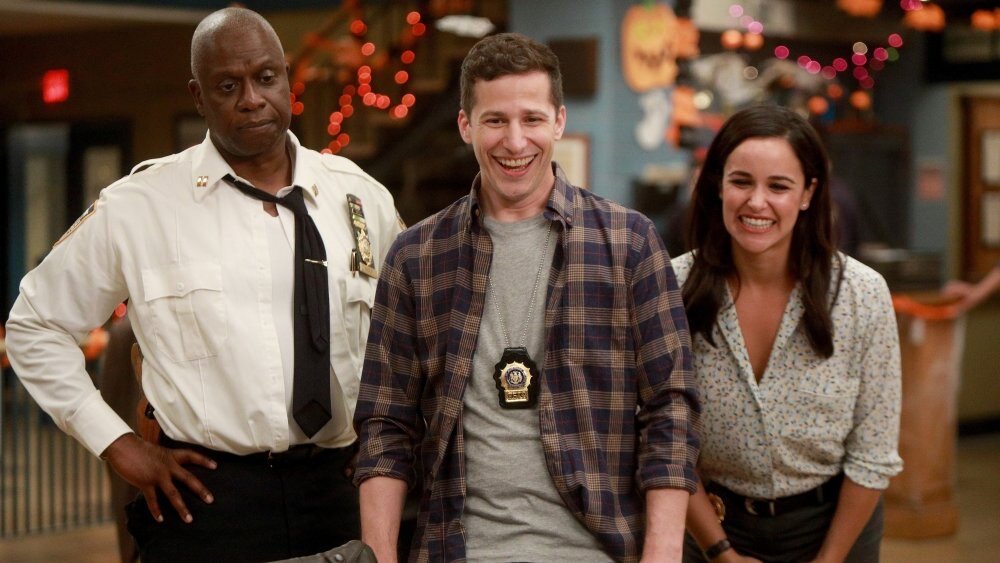Brooklyn Nine-Nine: Yes All Cops (Even Andy Samberg)
Mike Schur is an optimist. He creates worlds where the viewer feels like family; where everyone is welcome, and workplaces feel like home. Differences in opinions are valued, and diversity is welcome. Mike Schur creates idylls that have one foot out of reality. In Parks and Recreation, he created a fantasy where politicians are good actually, and in Brooklyn Nine Nine, the fantasy is that of cops being good guys. Starring world’s sexiest man Andy Samberg, Brooklyn Nine Nine follows detective Jake Peralta and his fellow cops working at the 99th Precinct of the NYPD. The diverse cast has been rightfully praised (of the core cast, only two are straight white men). The show has dealt with coming out stories and interracial relationships with sensitivity and humour. It’s also objectively hilarious; the “I Want It That Way” cold open makes me laugh every time. I’ve seen every episode (available on UK Netflix at the time of writing) multiple times, and like all Mike Schur shows, it’s comforting. It’s less comforting now though. Once again police brutality and the force’s institutionalised racism has reared its ugly head, and the concept of watching a nice, comforting TV show about cops is practically nauseating.
In season two, Jake starts dating Sophia, a defence attorney; upon finding out her job, he and the rest of the precinct are disgusted. He is chastised for “literally sleeping with the enemy,” and refers to a defence attorney as a “subhuman piece of human garbage.” Though they continue to date, Sophia is never given a chance to defend her job, and through the rest of the arc, the lawyers are portrayed as objectively the worst. Sophia’s boss is arrested for drug use, ends up kidnapping Jake, and throughout is portrayed as a complete goon. Anyone who dares speak up against New York’s Finest is the enemy. Who cares that the defendant has a right to professional representation in court, and who cares that New York leads almost every other state when it comes to wrongful convictions? The lawyer is the enemy, the cops are the good guys. Everything is fine.
In season one (admittedly when the show was still finding its bearings), Jake arrests suspected jewellery thief Kid Cudi, who was recently released from prison, without any solid evidence – just a hunch (also, because Kid Cudi called him “Joke Peralta,” which is apparently a crime now). The team have to cancel their weekend plans and try to find some concrete proof that he’s guilty, else they have to release him, and will likely be sued for wrongful conviction. Naturally, they are furious – not because of the gross miscarriage of justice, but because their weekend plans are ruined; they can excuse abuses of power, but they draw the line at having to cancel their plans. Good news though – the cops were right! Kid Cudi did do the crimes! It wasn’t a wrongful arrest, the white cop saved the day with his brilliant white hunch. Truly, the hero the city needs.
In the show’s defence, they have attempted to grapple with more serious issues. In season 3, Captain Holt, the no-nonsense deadpan captain played to perfection by Andre Braugher, tries to boost the public image of cops and realises that they have to listen to the public instead of selling a false idea of heroic cops. They also grapple with racism in the force when Terry gets arrested for walking after hours in his neighbourhood. He tries to form an official complaint, is initially dissuaded as it could affect his future career prospects, but then they file the complaint and everyone lives happily ever after. There’s no mention of whether the racist cop gets any punishment, but they do say that he’ll “think again” before racially profiling someone.
Will he though?
On several occasions, Captain Holt has referenced his difficulties working as a cop in the 70s as a Black openly gay man. “He was a great partner. Smart, loyal, homophobic, but not racist. In those days that was pretty good.” The implication is clear: homophobia and racism within the force is a thing of the past. The new cops would never dream of racism or homophobia or sexism, the new cops are great, and everything is fine.
The show sends the message that this isn’t a structural issue – that it’s just a few bad cops who just need a formal complaint against them. Surely by now we all know that this isn’t true; if it was just a few bad apples, then Black people wouldn’t be twice as likely to be pulled over. If it were a few bad apples then Black people wouldn’t be more likely to be searched once they’ve been pulled over. If it were a few bad apples, then why are unarmed Black people three times as likely to be shot by a cop than an unarmed white person? If it were just a few bad apples, then how come no one is saying that they’ve spoiled the bunch and that we need to throw the whole bag out?
It seems like a lot to put the onus of structural racism on a half-hour sitcom (and don’t get me wrong I’m definitely going to still watch it), but media affects how we view real life. Thanks to shows like Brooklyn Nine Nine, Death in Paradise, The Bill, Angie Tribeca and the endless CBS detective shows, the public is being fed a delusion that the cops are on your side. The police aren’t on your side when they’re pelting you with rubber bullets, they aren’t on your side when 40% of them are beating their wives, they aren’t on your side when you report a rape, and they certainly aren’t on your side if you’re Black.


